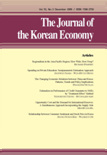The Changing Economic Relations between China and Korea : Patterns, Trends and Policy Implications

The economic rise of China and its integration into the globalization process is undoubtedly one of the most important developments of the past decades. The objective of the paper is to examine the changing nature and structure of the Korea-China trade and investment linkages, and to highlight the implications for the definition of Korea's economic policies vis-à-vis China, as well as vis-à-vis the rest of East Asia.
The paper starts by describing China's new role in the regional supply chain and the resulting change in the trade and FDI flows between China and Korea. It highlights the high degree of complementarity between the two economies and the nature of their respective participation in regional production networks. The next section examines the impact of Korea-China trade and investment linkages on Korea's regional economic policy. It suggests that the case against floating rates is less relevant for trade among countries such as Korea and China which share extensive production networks and are integrated in a triangular trade pattern with the Western markets. Regarding trade, the development of tight regional production networks suggests that the case for traditional free trade areas is rather weak, while trade facilitation is certainly desirable. In the wake of the current crisis, the shift in bilateral economic relations away from complementarity and towards rising rivalry may, however, substantially affect the game being played by the two countries.






